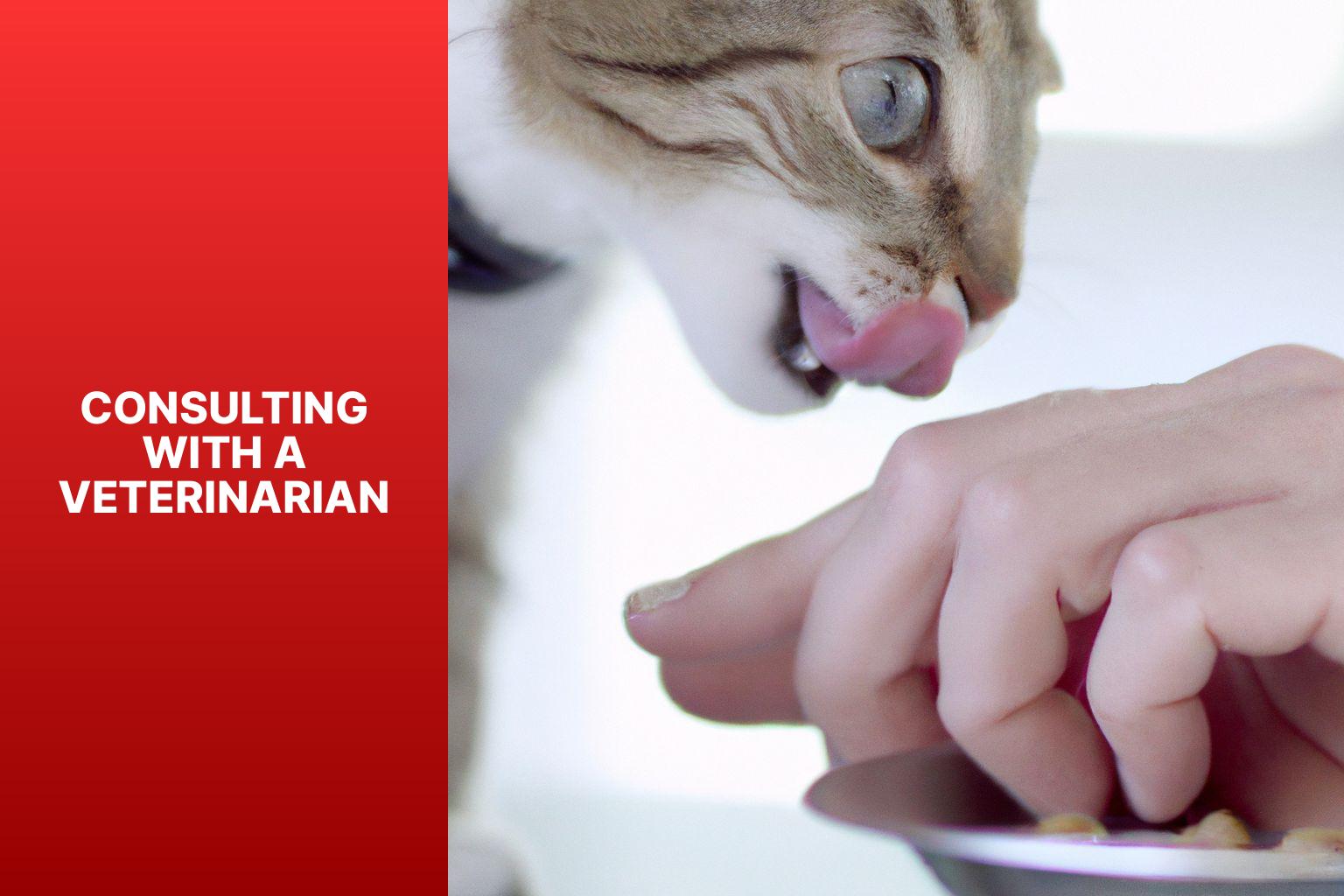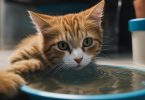Pancreatitis in cats is a condition characterized by inflammation of the pancreas, an organ responsible for producing digestive enzymes and regulating blood sugar levels. It can cause discomfort and serious health issues if not properly managed. Recognizing the signs and symptoms of pancreatitis in cats is crucial for timely intervention and effective treatment.
When it comes to managing pancreatitis in cats, diet plays a crucial role. Feeding a cat with pancreatitis requires a carefully selected and well-balanced diet aimed at minimizing pancreatic inflammation and providing proper nutrition. It is important to feed a low-fat diet to reduce the workload on the pancreas and choose highly digestible food to ease digestion and absorption. Adequate hydration is also essential to support the cat’s overall health.
There are recommended foods for cats with pancreatitis, including prescription diets specifically formulated for pancreatitis, homemade diets carefully prepared under veterinary supervision, and commercial diets that meet the dietary needs of cats with this condition. On the other hand, there are certain foods that should be avoided to prevent exacerbation of symptoms.
Feeding tips can also help manage pancreatitis in cats, such as dividing meals into smaller, frequent feedings and using feeding puzzles or slow-feeders to promote slow and controlled eating.
It is important to consult with a veterinarian when determining the best diet plan for a cat with pancreatitis, as the specific nutritional needs may vary based on the cat’s individual condition and health history. Working closely with a veterinarian will ensure proper management of pancreatitis and contribute to the cat’s overall well-being.
Key takeaway:
- Feeding a low-fat diet: Cats with pancreatitis should be fed a low-fat diet to reduce the workload on the pancreas and manage the condition effectively.
- Providing highly digestible food: It is important to feed cats with pancreatitis highly digestible food to ensure proper nutrient absorption and avoid triggering further inflammation.
- Ensuring adequate hydration: Cats with pancreatitis should be kept well-hydrated to support their overall health and prevent complications associated with the condition.
What Is Pancreatitis in Cats?
Pancreatitis in cats is inflammation of the pancreas. The pancreas produces digestive enzymes and insulin. Inflammation can disrupt pancreas function, leading to symptoms and health complications.
What Is Pancreatitis in Cats? Common signs of pancreatitis in cats include vomiting, abdominal pain, loss of appetite, lethargy, and weight loss. Veterinary attention is crucial if you suspect your cat has pancreatitis. It’s a serious condition that requires proper diagnosis and treatment.
To manage pancreatitis in cats, veterinarians may recommend dietary changes. A low-fat diet reduces stress on the pancreas and aids digestion. Feeding smaller, more frequent meals can also help. Proper hydration is important for overall well-being.
Signs and Symptoms of Pancreatitis in Cats
The signs and symptoms of pancreatitis in cats, also known as feline pancreatitis, can vary. It’s important to be aware of the following indicators:
lethargy, loss of appetite, vomiting, abdominal pain, dehydration, weight loss, jaundice, and diarrhea.
Cats with pancreatitis may appear weak or tired, lacking energy for their usual activities. They commonly experience decreased or complete loss of appetite. They may also frequently vomit. Cats may show signs of discomfort or abdominal tenderness. Pancreatitis can cause cats to become dehydrated, so it’s essential to monitor their drinking habits and water intake. Weight loss is a common effect of pancreatitis in cats due to decreased appetite and nutrient absorption. In severe cases, cats may display yellowing of the skin or eyes, a condition known as jaundice. Some cats with pancreatitis may have loose or watery stools, which is a symptom of diarrhea. If you notice any of these signs or symptoms in your cat, it is important to consult with a veterinarian for a proper diagnosis and appropriate treatment.
Importance of Diet in Managing Pancreatitis in Cats
When it comes to managing pancreatitis in cats, one cannot overlook the crucial role of diet. In this section, we will uncover the significance of dietary choices in effectively managing this condition. From incorporating low-fat diets to ensuring easier digestion, we’ll explore different approaches to feeding cats with pancreatitis. We’ll shed light on the importance of adequate hydration for their overall well-being. So, if you’re concerned about your feline friend’s health, read on to discover how the right diet can make a difference.
Feeding a Low-Fat Diet
Feeding a low-fat diet is crucial for managing pancreatitis in cats. When selecting a diet, it is important to choose one with a fat content of less than 10% to avoid triggering inflammation in the pancreas. It is recommended to look for prescription diets specially formulated for cats with pancreatitis, as they provide necessary nutrients while keeping the fat content low. Avoid feeding cats with pancreatitis human food, as it often contains high levels of fat that can worsen inflammation. Stick to cat-specific foods to ensure a balanced and low-fat diet.
In addition to being low in fat, the diet should also be high in protein to support your cat’s nutritional needs and overall health. Monitoring your cat’s weight and adjusting portion sizes accordingly is important for weight management, as obesity can worsen the condition of pancreatitis.
Feeding a low-fat diet helps reduce inflammation and alleviate symptoms of pancreatitis in cats. To determine the best diet plan for your cat’s specific condition, it is recommended to consult with a veterinarian.
Providing Highly Digestible Food
When it comes to providing highly digestible food for cats with pancreatitis, there are several options:
– Prescription diets: Specialized low-fat and highly digestible cat food brands, such as Hill’s Prescription Diet i/d Digestive Care, Royal Canin Veterinary Diet Gastrointestinal Moderate Calorie, or Purina Pro Plan Veterinary Diets EN Gastroenteric, promote easy digestion.
– Homemade diets: Feeding a homemade diet for pancreatitis can be an option. The diet should be low in fat and consist of easily digestible protein sources, such as lean meats (chicken, turkey) or fish (salmon, whitefish).
– Commercial diets: There are commercially available cat foods specifically designed for cats with pancreatitis. Look for brands that offer formulas labeled as “limited ingredient,” “sensitive stomach,” or “easy to digest” for high digestibility.
When selecting a highly digestible food, consult with a veterinarian to determine the best option for your cat’s specific needs and to ensure a balanced and complete diet. Introduce any new food gradually and monitor your cat’s response to ensure it agrees with their digestive system.
Ensuring Adequate Hydration
Ensuring adequate hydration is crucial for cats with pancreatitis. Here are some ways to keep your cat hydrated:
– Provide fresh water: Make sure your cat has access to clean water at all times. Replace it frequently for freshness.
– Consider moist food: Wet food can increase your cat’s water intake. Choose high-quality canned food with a high water content.
– Encourage water consumption: Some cats don’t drink much water on their own. You can add water to their food or use a water fountain to attract them.
– Monitor water intake: Watch how much water your cat drinks. If there’s a significant decrease, consult a veterinarian.
– Offer electrolytes: Veterinarians may recommend electrolytes to replenish lost fluids and maintain hydration.
Proper hydration supports the health and functioning of a cat’s pancreas. Remember to consult with a veterinarian for personalized advice.
Recommended Foods for Cats with Pancreatitis
When it comes to caring for cats with pancreatitis, knowing the right food choices can make all the difference. In this section, we’ll dive into the recommended foods for cats with pancreatitis. From prescription diets specially formulated to manage their condition to homemade options that prioritize quality ingredients, and even commercially available diets designed to support their digestive health – we’ll explore the various pathways to nourishing our furry friends. So, let’s dig in and find the purrfect meal options for our feline companions!
Prescription Diets for Pancreatitis
Prescription diets for pancreatitis play a vital role in managing this condition in cats. These diets are specifically formulated to meet the nutritional requirements of cats suffering from pancreatitis. It is important to know the following key points about prescription diets for pancreatitis:
1. Purpose: The main purpose of prescription diets is to reduce inflammation in the pancreas and support digestive health in cats with pancreatitis.
2. Low-fat content: These diets are carefully controlled to have a low-fat content so as not to worsen the symptoms of the condition.
3. Highly digestible ingredients: Prescription diets for pancreatitis consist of easily digestible ingredients that help with nutrient absorption and lessen the workload on the pancreas.
4. Specific nutrient profiles: These diets provide essential nutrients while minimizing the inclusion of ingredients that may trigger flare-ups of the condition.
5. Veterinarian recommendation: Before starting a prescription diet, it is important to consult with a veterinarian who can assess your cat’s specific needs and prescribe the most suitable diet.
6. Gradual transition: It is recommended to gradually transition your cat to a prescription diet over the course of about one week. This allows their digestive system to adjust smoothly to the new diet.
7. Strict adherence: It is crucial to follow the instructions provided by the veterinarian regarding the prescription diet and feeding guidelines. This ensures proper nutrition and overall health for your cat.
Prescription diets for pancreatitis are highly effective in managing this condition and can greatly improve the well-being of cats.
Homemade Diets for Pancreatitis
When managing pancreatitis in cats, Homemade Diets for Pancreatitis can be a good option. Consider these steps when preparing Homemade Diets for Cats with Pancreatitis:
1. Choose lean meats, like skinless chicken or turkey, that have less fat. Avoid fatty cuts of meat.
2. Include easily digestible carbohydrates such as cooked rice or pasta, which are gentle on the cat’s digestive system and provide energy.
3. Add small amounts of well-cooked vegetables, like carrots or green beans, to provide important vitamins and minerals.
4. Ensure proper hydration by adding water or low-sodium broth to the Homemade Diet for Pancreatitis.
5. Avoid adding seasonings, spices, or additives to the Homemade Diet for Pancreatitis as they may irritate the pancreas.
6. Consult with a veterinarian or veterinary nutritionist to create a well-balanced Homemade Diet for Pancreatitis that meets the cat’s specific nutritional needs.
7. Regularly monitor the cat’s condition and any changes in symptoms or behavior. Adjust the Homemade Diet for Pancreatitis as needed with guidance from the veterinarian.
By following these guidelines and working closely with a veterinarian, Homemade Diets for Pancreatitis can be a suitable option for cats in managing their condition.
Commercial Diets for Pancreatitis
Commercial diets for pancreatitis are essential for providing necessary nutrition while reducing strain on the pancreas. These diets have a low-fat content (4-6%) to alleviate digestive issues and decrease inflammation. They contain a moderate protein content (7-9%) to ensure essential nutrients for overall health.
One popular choice among cat owners is the Royal Canin Veterinary Diet Gastrointestinal, which is priced at $2 per serving. This brand effectively supports digestive health. Another reliable option is Hill’s Prescription Diet i/d Digestive Care, priced at $2.50 per serving. It relieves gastrointestinal upsets and promotes easy digestion. For a more affordable choice, the Purina Pro Plan Veterinary Diets EN Gastroenteric costs $1.80 per serving and contains highly digestible ingredients to support digestive health.
When selecting a commercial diet for pancreatitis, it is crucial to consult with your veterinarian to determine the best option for your cat’s specific needs. It is also important to follow the feeding guidelines provided by the brand and monitor your cat’s response to ensure that the diet is effectively managing their condition.
In a similar vein, a friend of mine had a cat diagnosed with pancreatitis. After consulting with a veterinarian, they decided to try the Royal Canin Veterinary Diet Gastrointestinal. They noticed a significant improvement in their cat’s digestion and overall well-being, with reduced symptoms and increased energy levels. This experience highlights the effectiveness of tailored commercial diets for pancreatitis in improving a cat’s health when managed properly.
Foods to Avoid for Cats with Pancreatitis
– It is important to avoid fatty foods such as high-fat cuts of meat, oily fish, and greasy treats for cats with pancreatitis. These foods can worsen inflammation and digestion issues.
– Dairy products should be avoided as well since cats cannot digest lactose. Milk, cheese, and other dairy products can aggravate pancreatitis symptoms.
– Spicy foods should be kept away from cats with pancreatitis as they can irritate the digestive system and trigger flare-ups.
– High-sugar treats should also be avoided as they can stress the pancreas and lead to complications. It is recommended to opt for low-sugar treats or alternatives.
– Raw meat and fish should be stayed away from since they carry a higher risk of bacterial contamination, which can be dangerous for cats with pancreatitis. It is better to stick to cooked meats and fish.
In a true story, a cat named Whiskers suffered from chronic pancreatitis. Whiskers’ owner followed a strict diet plan, avoiding trigger foods. Despite the challenges, Whiskers thrived and enjoyed a happy, healthy life with the right diet and veterinary care. This story reminds us of the importance of providing appropriate foods and care for cats with pancreatitis.
Feeding Tips for Cats with Pancreatitis
Feeding Tips for Cats with Pancreatitis:
1. It is important to feed cats with pancreatitis low-fat meals in order to reduce strain on the pancreas. Choose food that contains less than 10% fat.
2. Opt for high-quality protein sources that are easily digestible, such as lean chicken or turkey. This helps reduce the workload on the pancreas.
3. To prevent pancreatic inflammation, it is advisable to avoid high-carbohydrate diets for your cat. Stick to low-carb options like grain-free or limited ingredient diets.
4. Consider specialized diets formulated specifically for cats with pancreatitis. These diets may contain added digestive enzymes or be tailored to support pancreatic health.
5. Instead of giving your cat one or two large meals, divide their daily food intake into smaller, frequent meals. This can help prevent excessive stimulation of the pancreas.
Fact: Cats with pancreatitis may benefit from a prescription diet designed to support pancreatic health. It is crucial to consult your veterinarian for personalized feeding advice based on your cat’s individual needs.
Consulting with a Veterinarian
Photo Credits: Www.Catcornerblog.Com by Jesse Thomas
Consulting with a Veterinarian is crucial when dealing with pancreatitis in cats. In order to properly address the issue, it is important to schedule an appointment with a specialized feline health expert. During the consultation, make sure to provide a detailed history of your cat’s symptoms and medical records. Be prepared to answer questions regarding your cat’s diet, behavior, and activity levels.
To assess your cat’s health and determine the severity of the pancreatitis, the veterinarian will conduct a thorough examination. Recommended diagnostic tests, such as blood work, ultrasound, or a biopsy, may be necessary to confirm the diagnosis.
Based on the findings, the veterinarian will develop a personalized treatment plan for your cat. This plan may involve making dietary changes, administering medications, and implementing fluid therapy. It is important to follow the veterinarian’s instructions diligently and regularly monitor your cat’s progress.
Maintaining open communication with the veterinarian is essential, so promptly report any changes or concerns that you may notice. Scheduling regular follow-up appointments is crucial to reassess your cat’s condition and make adjustments to the treatment plan if necessary.
Remember, consulting with a veterinarian is imperative to ensure proper care for your cat and improve the chances of successfully managing pancreatitis.
Some Facts About What to Feed a Cat with Pancreatitis:
- ✅ Cats with pancreatitis should be fed easily digestible diets.
- ✅ Recommended diets for cats with pancreatitis should have moderate levels of protein from novel or hypoallergenic sources.
- ✅ The chosen food for cats with pancreatitis should be suitable for coexisting liver disease and inflammatory bowel disease.
- ✅ Canned food is preferred for cats with pancreatitis, but dry food can also be used if necessary.
- ✅ If a cat refuses to eat the recommended food, different diets can be tried, as it is better for them to eat some of the wrong diet than none of the right diet.






